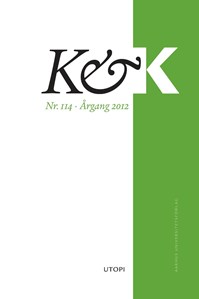Gerrard Winstanleys ikonoklasme som immanent utopi
DOI:
https://doi.org/10.7146/kok.v40i114.15702Nøgleord:
utopia, English Revolution, communism, iconoclasm, religion, politics, historicizationResumé
GERRARD WINSTANLEY’S ICONOCLASM AS IMMANENT UTOPIA | In this article I analyse the utopian discourse of Gerrard Winstanley as an example of how utopia functions as a social fiction. Winstanley was part of the radical Digger movement in the English Revolution in the mid-17th century, and he has been regarded both as a religious mystic and as a precursor of later communist thinkers. His last published text, The Law of Freedom in a Platform (1652), presents an egalitarian utopian program based on democracy and collective ownership of land. It has been arguedthat this text represents a break from Winstanley’s earlier religious and political writings because of its focus on the institutional framework of the proposed utopian model. I argue, however, that it is generally more productive to focus on the function of utopia and to see utopia as both a figurative and conceptual discourse which combines a deconstruction of ideological contradictions with a production of new sociopolitical representations. This approach allows us to analyse how Winstanley creates a utopian discourse based on a “materialistic” iconoclasm which produces a dynamic, immanent utopia. Rather than being a totalitarian vision, as some have argued, Winstanley’s egalitarian and immanent utopia dismantles the distinction between state and society. Utopia should be seen as a discourse which, through its use of sociopolitical fictions, is able to bring out different sociopolitical dimensions
and potentials of a specific historical conjuncture by articulating the non-realized futures of history.
Downloads
Publiceret
2012-12-20
Citation/Eksport
Jespersen, M. B. (2012). Gerrard Winstanleys ikonoklasme som immanent utopi. K&K - Kultur Og Klasse, 40(114), 45–59. https://doi.org/10.7146/kok.v40i114.15702
Nummer
Sektion
Artikler
Licens
Tidsskriftet følger dansk ophavsret.





